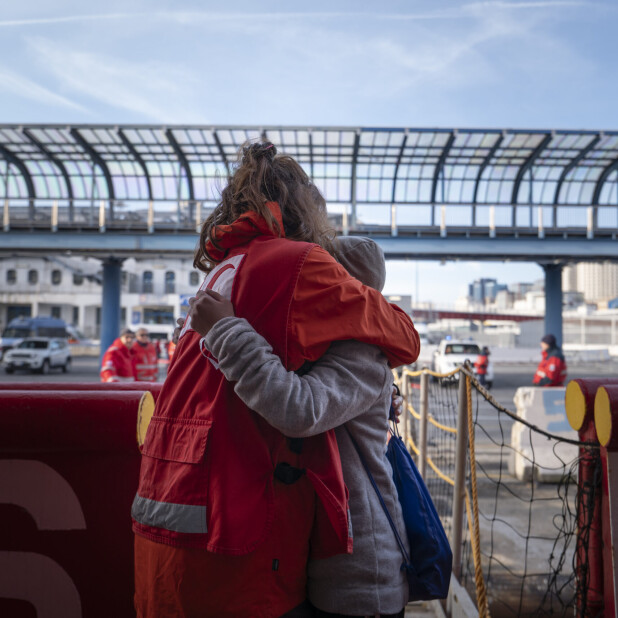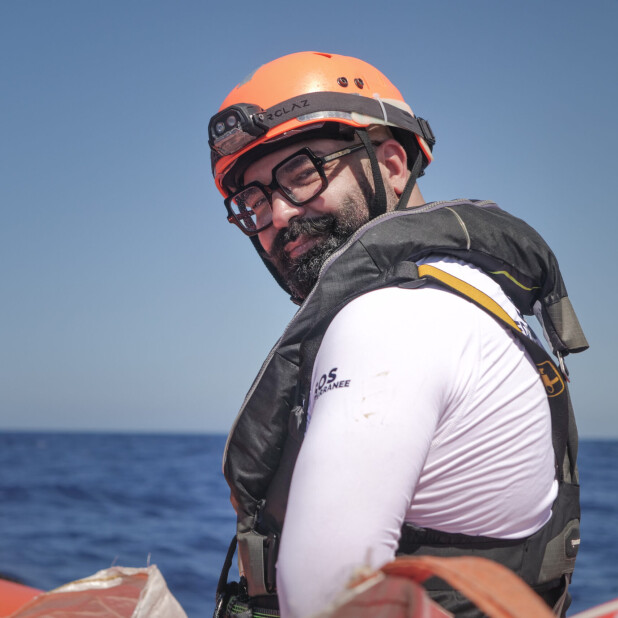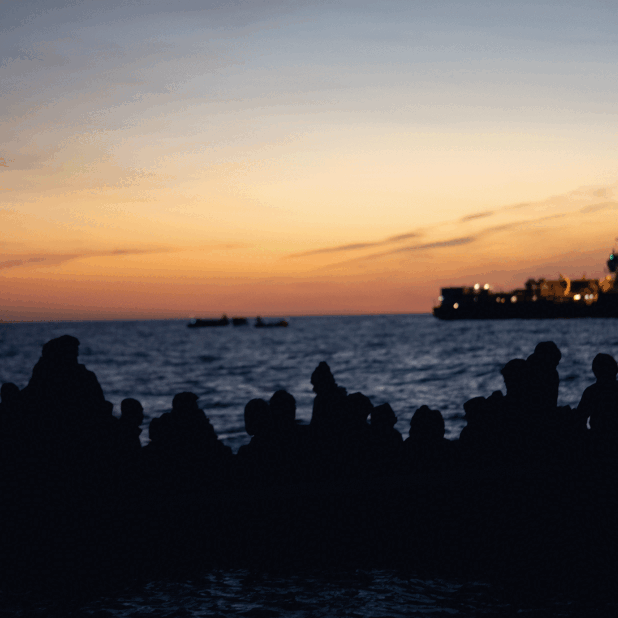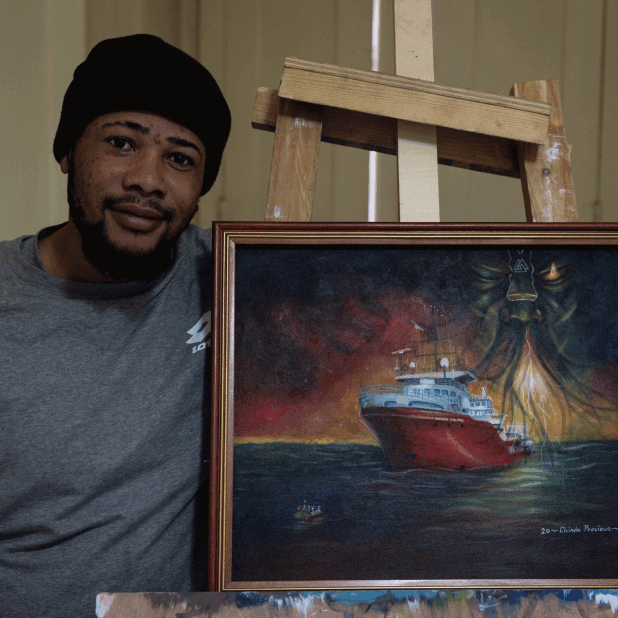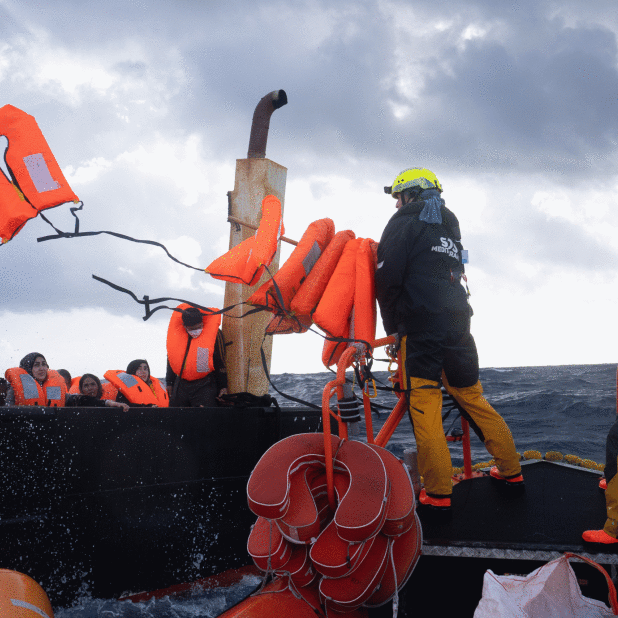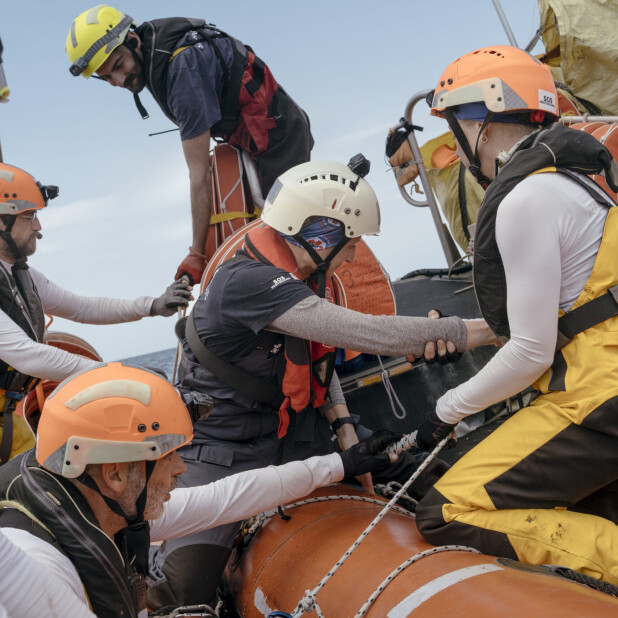
In her diary, Christine – nurse from Berlin and medical team leader on board the Ocean Viking – recounts her experiences.
Whereas the first entry mainly reveals her motivation join search-and-rescue as a nurse, the second entry summarises the subsequent events. Between those two diary entries a total of 374 people were rescued in three rescue operation and brought to safeta on board the Ocean Viking.
30th of January 2021
Ready for rescue, ready for rescue
Whenever a boat in distress is sighted from the Bridge of Ocean Viking, this is the message we hear on our portable radios. “All teams, all teams: ready for rescue, ready for rescue.” Now we have to be quick, especially the search and rescue team, because every minute counts. Us, in the medical team, we also have to prepare everything immediately to receive people on board and, above all, to potentially resuscitate people who almost drowned.
But let’s go back a few days, to the time between 20 and 29 January.
On 20 January, a distress call reaches us, a boat is in distress at sea, but before we reach it, it is intercepted by the Libyan Coast Guard. How bitter! They are taken back to the country from which they fled, to escape the torture, imprisonment and violence they tell us about.
Only one day later, on 21 January, we are informed in the morning by the NGO “Alarm Phone” that there is a boat in distress only about ten Nautical Miles from us. With approximately 120 people on board. By noon, all 119 survivors are on board of the Ocean Viking, fortunately none of them is in a critical health situation. Among the survivors is a little girl who was born on December 17. She is in good spirits, despite the difficult circumstances.
Luisa, our Italian search and rescue coordinator, requests a place of safety. But more distress calls reach us – the next day, at exactly 05:07 in the morning, we are woken up. Within one day, we find a total of three boats in distress, one is spotted directly from the Bridge of Ocean Viking. On the last boat, several people go overboard during the rescue, many smell of fuel as they come onto our ship. Their petrol-soaked clothes can cause skin burns when the fuel mixes with salt water. Many have also inhaled petrol, which confuses people and makes them get scared more easily.
We save 374 lives over these two days – everyone we rescue comes with their own story, their hardships, worries and also dreams. We experience so much gratitude and relief. But also unspeakable exhaustion and pain. On this mission, there were many women, children and young people travelling alone among the survivors.
Several women choose to tell us about the sexual violence that they endured in Libya. Such pain and trauma! I wouldn’t know how to go on living with such a mental injury. And yet they manage. Maybe because they want to live on for their children. Or because they don’t want to let their past get them down.
Four pregnant women are on board, one of whom, Nadine, would be at risk if she went into labour on board. I am glad that Hannah, a very experienced midwife from Australia, is part of the team. Together we decide to ask for the evacuation of Nadine, a precautionary yet urgent measure, since labour could set in at any time. Three hours after sending my request for the medical evacuation to the relevant authorities, she is picked up by the Italian coast guard and taken to Lampedusa. That was fast! Unfortunately she doesn’t have a phone so we won’t know what will happen to her next, but she knows her husband’s phone number by heart so she can inform him in Libya. Hopefully, sooner or later, a family reunion will be possible.
Luckily, the survivors only have to spend a few days on board. During this time, we try to organise a daily routine for them. Some have to sleep on the deck, outside the containers (the so-called “shelters”) which is hard, but there is no tension between the rescued people because of this. Our goal is that everyone receives the same level of care, but when there are many survivors on board, there have to be compromises. The children are in good spirits and play on the deck.
There is a lot of work for us in our very small hospital, but we have enough time for the serious cases. We are worried about a 5-year-old boy as we cannot control his vomiting at first. Many of the rescued people become seasick as the weather deteriorates, many have pain in various parts of the body, surely in part psychosomatic. One adolescent boy has a leg injury, multiple fractures as a result of his escape from a detention centre, one young man has an extremely infected gunshot wound from Libya that will surely take a long time to heal.
On 24 January – a special Sunday – the good news reaches us: a place of safety in Italy! We finally breathe out in relief. Also because the weather is very bad and the deck is repeatedly flooded by waves, even where people are sleeping. When we share the news with the survivors, the joy is overwhelming. Everyone cheers, sings, dances. We have finally made it.
But it still takes time until everyone has disembarked: on Monday, a team from the Red Cross and the health authorities comes on board in the afternoon. All survivors and us, the crew, are tested for Covid-19. We can breathe out again – everyone tests negative! However, only 111 people are able to leave the ship that day. The adult survivors are taken to a nearby ferry to spend at least 10 days in quarantine. It is strange for all of us not to know what will happen to them. But at least we were able to be there for them at a very difficult moment in their lives.
When I wrote my first post two weeks ago, my plan was to write again as soon as survivors would be on board. What an illusion! It just wasn’t possible, we all had our hands full all day.
Now we are in the port of Augusta in Italy. We had a day off, which was sorely needed, and are now using the time to prepare the ship for the next mission.

17th of January 2021
Today is my birthday. What a gift to be on the Ocean Viking! On the way to the Libyan Search and Rescue Region. At the moment, our vessel is the only ship that is operating in the central Mediterranean. But back to the beginning of the story.
After many years of working in humanitarian aid, especially with the organization Médecins sans Frontières, I needed a very long break in 2007. I had no more energy and decided to focus on my life in Berlin.
During these years, it was important for me to build a home in this great city, to improve my knowledge in the palliative care of tumor patients and to support the integration of refugees as a volunteer for “Flüchtlingskirche” (Refugee Church).
I started studying Buddhism, a philosophy that has brought a lot of answers for me personally. The tradition of the Vietnamese Moench Thich Nhat Hanh fits best for me. It has taught me that many everyday things that we tend to worry about do not have so much importance.
In recent years, I realized that I would like to dare to work in developing countries again. The wanderlust was great, the desire to turn my compassion into action grew. My life in Berlin felt too privileged to me. So I asked myself: is it possible to combine palliative work, which I also value very much, with humanitarian aid, i.e. to spend a few months in Berlin between assignments abroad?
For exactly one year I have been wanting to go on mission on a rescue ship. In the meantime, I traveled to Greece in August to work with a small medical aid organization in the Moria camp. That time was special, also because I was there during the fire.
Then I heard about the situation in Bosnia, in Velika Kladusa, and went there to help. People stranded on the Balkan route keep trying to cross the Croatian border and encounter brutal violence, have no access to the asylum system and keep getting chased back. Despite many difficulties, we succeeded to set up a medical project with MVI (Medical Volunteers International).
How bitter that Europe is closing itself off more and more, using brutal methods to ward off migrants, asylum seekers and refugees, even being willing to disregard human rights. In 2012, the European Union was awarded the Nobel Peace Prize. What value does such a prize hold in times like these?
And now a mission on the Ocean Viking. Finally. After long months of forced standstill, we had the opportunity to begin the tenth rotation. We have been following strict COVID-19 prevention and mitigation guidelines so as not to jeopardize the rotation and to be sure that we set sail with a corona-free team on board.
The time of the quarantine was used intensively: working from the isolation of our hotel rooms, we completed trainings, watched presentations to learn or to update our knowledge, and did practical exercises. The 31-person team consists of the ship’s marine crew, the search and rescue (SAR) team, a care team responsible for organizing and overseeing the care for rescued people on board and us – the medical team.
We might be a small medical team, but we are four strong women. Hannah, the midwife, was fortunately also on board for the last rotation of the Ocean Viking in summer, so she already knows the ship very well. Ophélie is a nurse from Belgium with lots of experience in intensive care. Caterina, the Italian doctor who lives in Berlin, has worked on a different rescue ship before. I complete the team, I’m also a nurse, but as Medical Team Leader, I am responsible for the coordination of the team and of the medical care onboard.
Next time I write, we may have survivors on board already. As I am typing this now, we keep ourselves ready for potential rescue operations in the Libyan Search and Rescue Region.
Over and over, I try to imagine how the people must feel, on unseaworthy boats, crammed together, already traumatized by everything that has happened to them in their home country, on the run and amidst the instability of Libya. And fleeing again now. The Mediterranean is a mass grave of people who drowned in the attempt to flee. Nobody leaves home voluntarily.
We help them survive, quite simply, and testify to what we witness.
I am grateful that I can be there, that I have an opportunity to be useful in this terrible situation. I have always believed that we can, that we indeed must, change this world, even only a little. It makes me happy to be there for others.
***
Photo credits – title: Fabian Mondl / SOS MEDITERRANEE – Christine (on the right side of the picture) during a training on board the Ocean Viking
Photo credits – post: Hippolyte / SOS MEDITERRANEE – Christine helping one rescued women to get some rest in the so called Shelter

